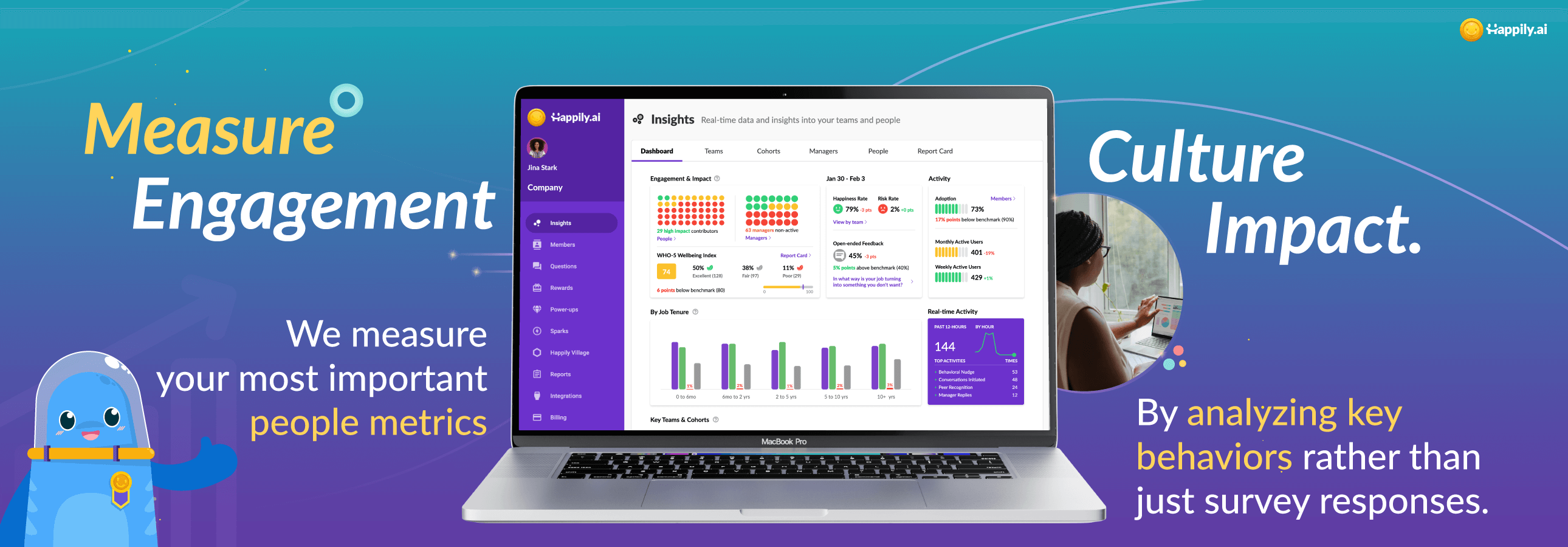Uncovering the Essential of People Managers
People managers are the unsung heroes of the workplace. They're accountable for closing the strategy-execution gap while often playing the role of individual contributors too. By highly engaging with their team and actively responding to feedback, managers create a positive work environment that fosters collaboration and productivity. In contrast, employees feel undervalued and frustrated when employees work under poor managers. Their feedback is consistently ignored and, eventually, they lose trust in the management team, leading to a lack of collaboration and lower productivity. In fact, research shows that poor leadership causes employees to experience lower job satisfaction. Since encountering toxic behaviors at work is one of the most critical reasons for low job satisfaction, we explore the manager’s role in preventing toxic behaviors in the workplace.
A total of 660 employees across 7 companies participated in our study. To evaluate a manager, we look at how often a manager replies to feedback and view team insights delivered to them. Managers are then grouped as active, passive, or inactive managers by the following criteria:

Moreover, we examine experiences toward toxic behaviors in the workplace by asking employees, "How often do you experience toxic behavior (i.e. blaming, taking credit for someone else's work, bullying, self-centeredness, treating others unfairly) at work?".
We find that employees who serve under an inactive manager are more likely to experience toxic behaviors at work. Figure 1 shows a positive correlation between the ratio of employees under inactive managers and experiences of toxic behavior at work. This trend holds true regardless of the company size, as shown in Figure 2 (where the bubble size represents company size). Toxic behaviors thrive when managers and leaders ignore feedback, are not proactive, and disengage with their team.
This is the beginning of the nightmare. Employees feel resentment, frustration, and undermined, which leads to an increase in toxic behaviors such as bullying, harassment, or discrimination. Working in such unpleasant conditions is a real struggle. Toxicity in the workplace decreases morale and causes unwanted conflicts, resulting in mental exhaustion and burnout – a deterrent to high-performing teams. Such that employees become disengaged, have low well-being, feel 5 times less satisfied with their workplace and become detractors – they do not recommend their organization as a great place to work.
Subscribe to our newsletter to be the first to receive our follow-up managers and toxic behaviors study
To prevent a toxic work environment, management should prioritize the following initiatives:
1. Practice emotional intelligence (EQ)
Emotional intelligence (EQ) is the ability to understand and manage our own emotions, as well as recognize and influence the emotions of your team members. EQ consists of 4 components: self-awareness, self-management, social awareness, and relationship management.
High-EQ managers are aware that their emotions have an effect on their team. They are able to step back, control and manage their emotions very well. Moreover, they can read the room and recognize their team’s dynamic. High-EQ managers are better at coaching, mentoring, and resolving conflicts.
When done right, 360-degree feedback can provide an opportunity for managers to tap into emotional intelligence development.
2. Be attentive and responsive to feedback
Employees want to work in an environment where their voice is heard and valued. When receiving feedback, managers should acknowledge and respond, even if they disagree. They can express appreciation for a different point of view.
Accepting critical feedback is challenging for most. It requires patience and vulnerability. Managers have the opportunity to role model how feedback should be received and how EQ can be practiced in the workplace.
All in all, a trusting relationship between managers and employees fosters better employee engagement, collaboration, and productivity.

Conclusion
Managers are essential to creating a toxic free workplace by being proactive and attentive, holding space for feedback and difficult conversations. Confronting toxic behaviors is an anxiety-heavy interaction with high impact. To prevent toxic culture, managers should practice emotional intelligence (EQ) and be attentive and responsive to feedback. Effective managers foster collaboration, a healthier workplace, and high-performing teams.
How we can help
Happily.ai helps companies develop emotional intelligence in the workplace. We provide opportunities to practice human skills —critical thinking, empathy, self-awareness, optimism, and more —in daily feedback. We also help create a feedback culture and improve workplace relationships. There are no shortcuts, but we help you put the right pieces in place (within days, not months!). Check out how Happily.ai can drive positive change in your workplace. Make effective managers a top priority today!

Resource:
https://managementtraininginstitute.com/why-managers-who-accept-feedback-are-well-respected/
https://online.hbs.edu/blog/post/emotional-intelligence-in-leadership









